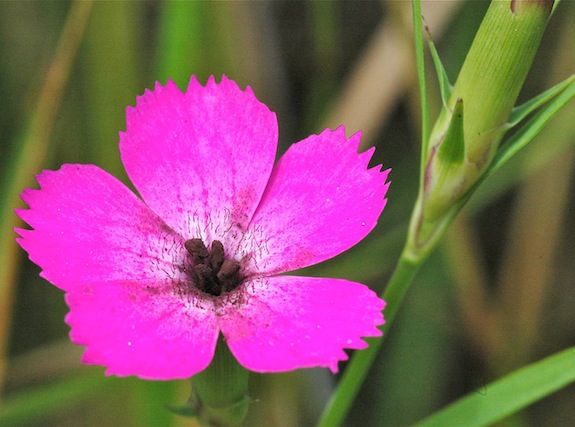Wildflowers Can Get STDs, And This App Wants You to Help Track One
That’s right, flowers can get STD’s. And these scientists want your help figuring out how common one plant STD is

A flower with the tell-tale dust of anther smut. Image: Amherst University
Did you know that Darwin was fascinated by STDs? Not the ones that you’re thinking of—a particular sexually transmitted disease in wildflowers. That’s right, flowers can get STDs. So can insects. Anything that reproduces can pass diseases to one another during sex.
The particular wildflower STD that intrigued Darwin so much is called anther smut. It’s a parasitic fungus that infects wildflowers and leaves a dark powder on their petals. You can see the dark powder in the image above. Anther smut is spread from plant to plant by insect pollinators. It doesn’t kill the flowers or cause any harm to humans. And since it can easily be grown in the lab, it’s a pretty good fungus for scientists to study.
But one group of scientist is asking for help to do just that. According to Amherst University, researchers have built an app for people to use called weLogger, for people to document sightings of anther smut.
“weLogger allows the user to take an image, video or audio and the app automatically logs GPS coordinates, time and date and then stores that information in a custom server application we are giving away with the app,” Scott Payne, the app’s developer, told Amherst. “weLogger works with the custom Google Maps application to offer a global perspective of whatever is being studied.”
Darwin might have used the app if he could, but instead he was limited to writing about his observations. He corresponded with Lydia Becker, a leader of the women’s suffragette movement in England and botanist. Becker hoped to create an earlier version of plant tracking apps, by creating a competition asking amateur naturalists to collect plants around Manchester, so scientists could understand their distribution. Apparently, scientists were not pleased by her attempts at encouraging citizen science in the 1800s. “There was a whole series of letters, some signed by groups of scientists, saying ‘the last thing we want is a bunch of amateurs traipsing through the countryside ripping plants out of the ground,’” Hood told Amherst.
Today, Becker is vindicated in the thousands of citizen scientist projects out there, including this one focusing on the anther smut that she and Darwin were so fascinated by. Oh, and she also won out on that suffrage issue, too.
More from Smithsonian.com:
The Life and Writings of Charles Darwin
Citizen Science Projects Are Actually Helpful to Science
/https://tf-cmsv2-smithsonianmag-media.s3.amazonaws.com/accounts/headshot/Rose-Eveleth-240.jpg)
/https://tf-cmsv2-smithsonianmag-media.s3.amazonaws.com/accounts/headshot/Rose-Eveleth-240.jpg)